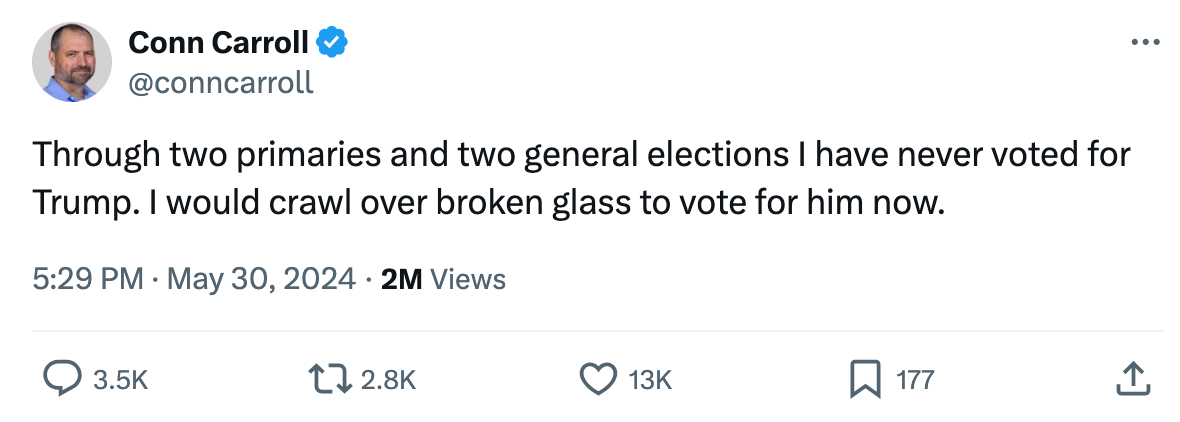On May 30th, 2024, Donald Trump was unanimously convicted by a jury of his peers on all 34 felony counts of falsifying business records in his porn star hush money case. This was the first of the former president and current presidential candidate’s four criminal cases to go to trial, and the first time in US history a president became a convicted felon — but not the first major lawsuit Trump has lost. In May 2023, a jury in a civil suit found Trump liable for sexual abuse of writer E. Jean Carroll in 1996 and ordered him to pay her $5 million. Trump’s continued public defamation of Carroll in the wake of the trial led to a second civil suit in January 2024 in which a jury awarded her an additional $83.3 million.
I didn’t closely track this hush money case. After eight years of “walls closing in” Trump discourse, I’ve long since run out of emotional energy to follow every twist and turn. But I happened to be on Twitter just as the verdict dropped, and the reactions were wild to observe as they rolled in. As blue-team cheerleaders and never-Trumpers gloated with endless variations of “Trump finally won a popular vote”, Trump supporters worked themselves into a frenzied and delusional lather, rallying around the conviction that his convictions will turn out to be a blessing in disguise. Throngs of posts in which people declared they were voting or donating to Trump went viral in the hours that followed. Don Jr. declared that America is a “third-world shithole.” The mood of the moment was perhaps best captured by an editor for the conservative Washington Examiner, who proclaimed, “Through two primaries and two general elections I have never voted for Trump. I would crawl over broken glass to vote for him now.”
The Trump wagons are certainly circling. His campaign raised $34 million in a day, nearly a third of which came from new donors. The money rushed in so fast the website crashed. Articles and op-eds churned out to suggest that the guilty verdict would only galvanize support and make Trump stronger. The narrative that felon-Trump is a stronger candidate than non-felon Trump is nothing if not bold, but does it make any contact with reality?
The first question to examine is whether there’s an actual bloc of undecided or non-Trump voters who did not support Trump and were not planning on voting for him until his 34 felony convictions. In other words, is there an electorally significant net number of people who, all things being equal, are more likely to vote for a felon than a non-felon? That such questions even need asking is depressing, but the answer thankfully holds the line on basic sanity.
Back in January, a Bloomberg News/Morning Consult survey showed that 53 percent of registered voters, including 57 percent of independents and 23 percent of Republicans, would be less willing to vote for Trump if he were found guilty. This compares to 40 percent of registered voters who said they’d be willing to vote for Trump if found guilty. These are fairly stunning numbers, and perhaps an outlier. A more recent Reuters/Ipsos poll from April found that 33 percent of Americans would be less likely to vote for Trump if he were convicted, including 15 percent of registered Republicans and 34 percent (a plurality) of independents. By contrast, just 18 percent of US adults said they’d be more likely to vote for Trump if convicted, including 16 percent of independents. A follow-up on May 31st found that 10 percent of Republicans were less likely to vote for Trump post-verdict, along with 25 percent of independents (18 percent said they were more likely).
Similarly, a CBS/YouGov poll just after the trial found that 57 percent of US adults, including 56 percent of independents, thought the right verdict was reached. Morning Consult found that 54 percent agreed, and 49 percent of independents believed Trump should drop out of the race as a result.
Still, we should take “less likely/more likely” polls with a grain of salt. Opinions shift, the news cycle changes, and voters have the memories of goldfish. Plus, “less likely” doesn’t necessarily mean “not voting for.” If you’re 95 percent sure you’re going to vote for Trump, and that drops to 75 percent, you’re still probably going to vote for Trump. Skeptics can dismiss this all as speculation, but the horse race polls themselves have begun to shift as well.
The Real Clear Politics national polling average shows a 0.4 point shift in Biden’s favor since May 30th. The FiveThirtyEight average shows a 0.6 point shift for Biden. These are modest changes, however Trump’s lead had already narrowed to within the margin of error prior to the conclusion of the hush money trial. In a race this tight, small movement could be enormous. That being said, the number of polls that have been conducted in the time since the verdict are limited, especially at the state level. We will certainly know more in the coming weeks and months, but with the evidence we currently have, it’s clear that Trump’s convictions are hurting him, not helping.


In all the years of debate over the pros and cons of criminally prosecuting Donald Trump for his many crimes, I have always found merit in both sides’ arguments. It’s hard to disagree with the ideal that nobody should be above the law and that people in power should be held accountable for their actions. At the same time, it’s also true that criminally prosecuting a head of state sets a dangerous precedent and opens the door to normalizing criminal prosecutions as a partisan cudgel. I don’t want my political leaders to be criminals. I don’t want them held to a more lenient standard than the average citizen. I also don’t want to live in a banana republic where politicians jail their adversaries. I don’t have any immediately actionable answers here.
(As always, the partisan “law and order” about-faces have been amusing to observe. When the opportunity presents itself, progressives ditch their calls for “restorative justice” in favor of fire-and-brimstone retribution, while “lock her up” Republicans adopt San Francisco Rite Aids as their spirit animals.)
Criminally prosecuting Donald Trump may turn out to be a long-term mistake, one that leads to a further erosion of democratic and liberal norms. Or it may not. But if it is a mistake, it’s not a mistake that will hurt Democrats in 2024, and anyone who says otherwise is feeding you spin with a side of copium. Trump is still ahead in the polls. He may very well win in November. If he does, it will be in spite of his felony convictions, not because of them.
See also: “Our Very Heterodox Prophets of Doom”
Subscribe now and never miss a new post. You can also support the work on Patreon. Please consider sharing this article on your social networks, and hit the like button so more people can discover it. You can reach me at @AmericnDreaming on Twitter, or at AmericanDreaming08@Gmail.com.







In fairness to progressives (of which I am not one), I think Trump might merit restorative justice if for the first time in his life he took responsibility for his transgressions.